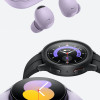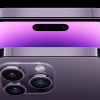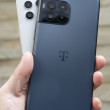Review: Casio Gz'One Commando 4G LTE for Verizon Wireless
Menus
The Commando LTE 4G runs Android 4.0.4 with a heavy skin from Casio and Verizon. The underlying architecture of the operating system is obviously Android Ice Cream Sandwich, but the entire appearance has been treated with a unique design from Casio. Last year's Commando ran Android 2.2, so Android 4.0 is a huge upgrade. Even so, there's no excuse for a device being released in mid-2013 to not have at least Android 4.1 Jelly Bean on board.
The lock screen has two shortcuts (camera and unlock), but it is not customizable. The clock is visible on the lock screen, of course. There's also a compass, which I think is a cool idea to add to a lock screen; one look and you always know which way is north.
There are five home screen panels out of the box, but you can add or subtract them at will. All of them a littered with a ridiculous number of widgets. I've never seen a more cluttered set of home screens on a phone. Obviously, you can completely customize what widgets, apps, and shortcuts appear on the home screen panels. There are five shortcuts available in a persistent dock at the bottom of the home screens. These can be customized as well, though one always has to be the main app menu. The Commando also loses the customizable swipe menu that was part of last year's model.
The main app menu is composed of grids out of the box. Apps can be viewed in an alphabetical grid, or by frequency or usage date. Apps can't be manually rearranged, though they can be dropped into folders. The Commando LTE 4G doesn't want you hiding apps from view, however, and you also can't view the main app menu as a list.
The notification tray and the main system menus function as they do on most other Android smartphones. For example, the notification tray provides access to the wireless radios, notifications, and the main settings menu. The settings are organized as always, with the network stuff grouped up at the top, followed by device tools, personal preferences, and finally system details.
Lastly, there's a separate Menu setting called Glove Mode. It basically rewrites the entire user interface such that only a few functions are available and are large enough to be accessed when wearing gloves, which the Commando's screen supports. It's sort of like Car Mode, but for gloved hands. There are only a few functions available (view notifications, view email/messages, open camera, access phone.) Anything beyond these isn't available during Glove Mode. I have to ask, what's the point? Sometime skiers like to listen to music when carving some fresh powder.
As far as performance goes, the Commando makes improvements over last year's model, but it's still not perfect. The original device had an 800MHz processor and this year's device has a dual-core 1.5GHz processor. The faster chip makes major gains in the performance speed of the system, but it still felt a wee bit sluggish. Screen transitions were sometimes slow, and apps sometimes crashed. It felt bogged down from time to time.
Calls
Casio's phone dialer interface is large and it's easy to sort through call logs, contacts, favorites and in-call features. There's a neat little drop-down arrow that shows you a handful of your most-recently dialed calls that can be viewed from the dialer without requiring you to head over to the full call history section of the phone app.
Contacts
The Commando will import all your Google and Exchange contacts if you have them. Adding Facebook friends is optional. If you choose to do that, the contacts application is smart enough to add the Facebook profile photos to your existing contacts and merge them into one contact. Android and the Commando offer a well-integrated set of tools for managing contacts. I like the widgets available for your favorite set of contacts.
Messaging
The Commando doesn't stray at all from the basic set of messaging services offered on most Android devices. It has the same stock email, Gmail, SMS, IM, and Google+ and Google Hangouts applications, and these apps all behave as they do on other Android devices.
There are no other messaging apps onboard; not even Facecbook and Twitter. You have to download those and others on your own.




























 Casio Commando Uses Bluetooth 4.0 LE With G-Shock Watch
Casio Commando Uses Bluetooth 4.0 LE With G-Shock Watch
 Verizon Scores the Casio G'zOne Commando 4G LTE
Verizon Scores the Casio G'zOne Commando 4G LTE
 FCC Outs Casio G'zOne Smartphone for Verizon
FCC Outs Casio G'zOne Smartphone for Verizon
 Samsung Upgrades its Wearables
Samsung Upgrades its Wearables
 iPhone 14 Plus Offers a Big Screen For Less
iPhone 14 Plus Offers a Big Screen For Less
 Casio G'zOne Commando 4G LTE
Casio G'zOne Commando 4G LTE




